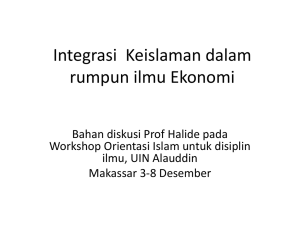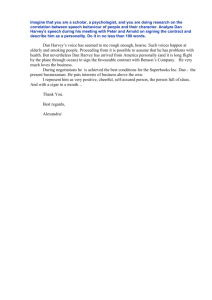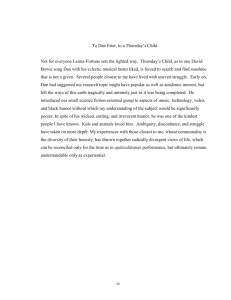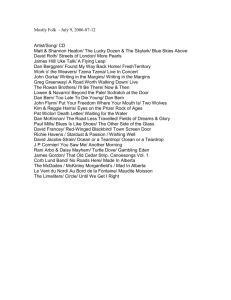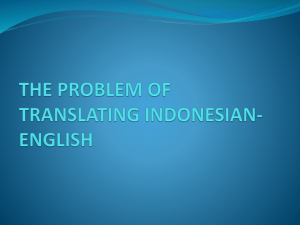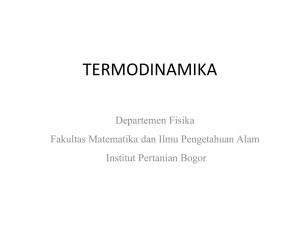Pertemuan-4
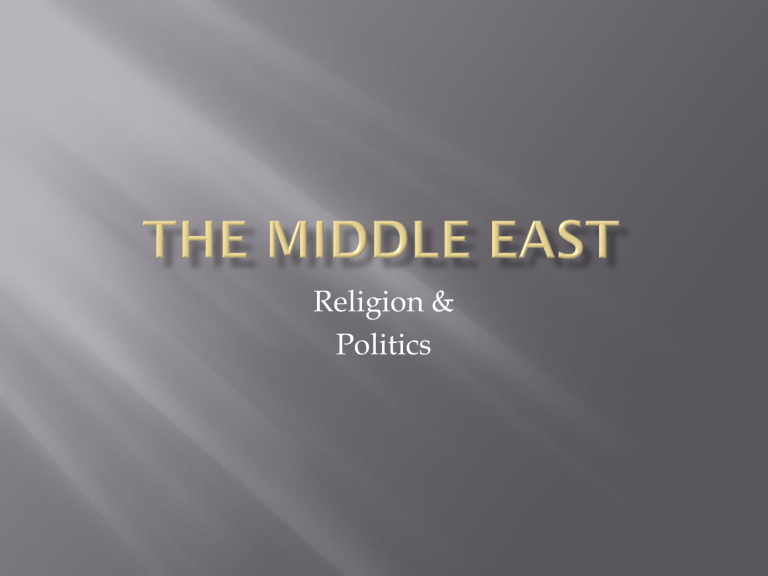
Religion &
Politics
Similarities
Belief in one God (monotheism)
All 3 trace their roots to Abraham
Palestine is the holy land
Social Justice is key part of all 3 religions
Pentateuch / Torah
1 st 5 books of the Old Testament
Talmud – collected decisions of the rabbis
Forgiveness of sins depends on one’s willingness to repent and do good deeds
Orthodox vs Reform
Zionism – Jewish homeland
Theodor Herzl: Der Judenstaat
West created after WWII to ensure a safe haven for
Jews after the Holocaust (part a long history of anti-
Semitism in Europe)
Belief that Jesus was the son of God differentiates it from Judaism
Jews do not believe he was the Messiah prophesized in the Old Testament
Tensions between Christians & the other major religions
Crusades –for 300 years, Christians tried to wrest control of the holy land from the Muslims
Brutal treatment of both Muslims & Jews
Holy Warriors: Richard & Saladin
Inquisition– tortured Jews to get them to convert
Holocaust – Hitler’s determination to wipe out Jews
622 C.E. (common era) is Muslim year 1
Koran is the Holy book of Islam
Like other two, stresses the importance of social justice
Key tenet: unity of God (rejects the Trinity)
Muhammad received revelations from the
Angel Gabriel
Abraham, Jesus & Muhammad were prophets
Jews & Christians are also “people of the book”
Unlike Christianity,there has not been a
Muslim reformation
Manji argues that Islam has actually regressed
Women used to play a larger role in Muslim society ijtihad –lost tradition of independent thinking
Unlike Judaism & Christianity, only in Islam is literalism “mainstream”
Islam needs to deal with treatment of women & minorities (such as Jews)
European colonial domination began to ebb by the 20 th century
led to a rise of nationalism of Jews & Arabs
Palestine is the “twice promised land”
Promised to both Arabs & Jews
Arabs refused to recognize Israel (which was created by European powers) & attacked
Israel won independence & 1967 war conquered
West Bank & Gaza Strip
Egypt, Jordan & Turkey have decent relations now
For more on Palestine, go to http://www.un.org/Depts/dpa/qpal/
Dreyfus affair illustrated anti-Semitism in
France
Jewish Nationalism was originally not about religion, but ethnicity
Balfour declaration – promised the creation of Jewish state in
Palestine
Arab Nationalism was also originally about self-determination, not religion
Emir Faisal accepted the Balfour declaration, but only paired with Arab independence, which was reneged upon by the British
“the fact that the leader of the Arab nationalist movement and the
Zionist movement could reach an understanding is significant because it demonstrated that Jewish and Arab aspirations were not necessarily mutually exclusive.“ from http://www.us-israel.org/jsource/History/faisal_balfour.html
Parliamentary democracy
Israeli Arabs can vote, but discrimination is getting worse
Palestinians in the West Bank & Gaza cannot vote
Likud (hard-line party) currently dominates
Minor parties play an important role
Settlements & the Palestinian issue
Undivided Jerusalem?
Al Aqsa incident
Israel is a modern, mostly democratic country
Settling the Palestinian issue is most important for getting Israel’s economy back on track
dictatorship since Sadats 1981 assassination
Stable only b/c of repression
Mubarak has never ended the state-of-emergency
Islamic fundamentalism is a major problem
esp. since Egypt signed 1979 peace treaty with Israel
July 2000, Egypt’s High Constitutional Court ruled that judges must oversee elections
Go here for more info on Islam in the Middle East http://news.bbc.co.uk/1/shared/spl/hi/middle_east/03/islam_around
_the_world/html/middle_east_sa.stm
Sharia is foundation of Iranian law
Struggle between reformers & fundamentalists
1997 : Khatami (reformer) won elections, but wasn’t able to get laws through
Council of Guardians—religious leaders that oversee the government
2004 : reformers boycotted elections after hardliners blocked many of their candidates from running http://news.bbc.co.uk/1/hi/world/middle_east/3514
551.stm
Ataturk – westernized (secularized) Turkey
democratic, but some human rights issues
Kurds
Why was Turkey so opposed to US invasion of Iraq?
Recep Erdogan (Muslim “Justice & Devel Party”) won
2002 election http://news.bbc.co.uk/1/hi/world/europe/3579467.stm
34% of the vote; got 363 of 550 seats, but has not made any radical changes in the past, the military has often stepped in when Turkey moved away from secularism
Saudi family dynasty
King Faud suffered a stroke in 1995, so Crown Prince
Abdullah runs the show
Rigidly traditional political & social system
Wahhabi interpretation of Islam (strict)
Therefore, no need for a constitution
Mistreatment of women & minorities
Dependence on oil revenues keeps its economy overly linked to oil prices
“reverse oil crisis” in the 1980s caused a drop in oil revenues by ½
Made huge profits during Iran-Iraq war
Dependent on US for protection
ironically, US support for Saudi Arabia’s corrupt regime is one reason for Bin Laden’s anger at the US
where the majority of Christians lived by the Middle Ages.
Islam flourished in the Middle East in the 800’s and Arabic became the official language of this region.
Except for the Crusades, the Middle East has been dominated by Muslims for almost 1400 years.
WWII: Jewish claims to the region, especially the land of
Dominance over the region has shifted from one religious affiliation to another over the years, bringing battles both political and religious that continue to this day.
Basis sosial masyarakat kawasan timur tengah dapat di identifikasi melalui pola budayanya yang dapat tercermin dari :
1.
2.
Tradisi kesukuan, agama,
3.
4.
ke-arab-an, dan nasionalisme.
Basis sosial masyarakat di Timur Tengah pada umumnya bertumpu pada kenyataan sebagai masyarakat kesukuan (Tribal Society) dan budayanya berpola kepada kesukuan. datang dan dibangun oleh sukusuku pengembara (Nomadic Tribe).
Karakteristik : mobil dan agresif, sikap alami adalah kegelisahan, ekonomi berpusat kepada peternakan dan bercocok tanam kecil-kecilan, keberagamaan yang shaleh dan puritan, melahirkan corak perfeksionisme regilius dan moral.
Penemuan dan penambangan ladang-ladang minyak warga pribumi merangkak sejahtera dan mengalami transformasi modern dari kehidupan tradisional menuju formalitas modern lebih maju
Masih terciptanya hubungan Patron Client antara penguasa dengan beberapa suku
•
•
•
Kawasan timur tengah merupakan kawasan yang memeluk agama samawi
Hampir 90 % negara-negara di Timur Tengah memeluk agama islam, masih ada kesadaran terhadap nilai-nilai islam yang terefleksi kepada sistem dan konstitusi negara, sedangkan 10% merupakan pemeluk nasrani
Pemikiran islam yng terbagi kepada pemikiran
Sunni, Syiah, wahabi, dll
•
•
Perbedaan paham antara sunni, syiah dan wahabianisme tetap mengakar kepada garis sejarah dan perkembangan masyarakat arab, walaupun secara gradual mereka tetap memiliki kesadaran secara kolektif sebagai bangsa dan kesetiaan pada negara.
Perbedaan paham ini bisa diamati pada ke-khasan cara hidup yang di anut , pandangan hidup dan tata nilai yang diikuti secara hirarki kekuasaan intern yang ditaati : nampak pada sistem kepercayaan dan ritual masing –masing paham atau mazhab tadi
•
•
•
Perbedaan paham akan semakin dipertajam, bila masing-masing kelompok menggalakkan dan mengintensifkan perbedaan-perbedaannya yang dapat melahirkan konflik yang tajam.
Lahirnya sekterian-sekterian internal mazhab, perkawinan endogami dalam satu sekte yang semua digunakan untuk melestarikan tradisi dan subkultur aliran keagamaannya masingmasing.
Lahirnya rezim-rezim yang berangkat dari kekuasaan mazhab kepada wilayah-wilayah mereka
•
Dalam hal ini nasionalisme arab dapat dikatakan sebagai kategori kesatuan masyarakat –bangsa yang dikatakan oleh Hans
Kohn (the idea of nationalism) dalam bentuk
State of mind and act of conciousness atau adanya kesadaran kepada seluruh organ masyarakat yang pluralistik untuk kemudian bisa bersatu padu saling menjalin persatuan dan kesatuan untuk mencapai tujuan bersama.
Intrumen yang digunakan adalah negara dan kemudian melembagakan bangsa.
Secara sederhana, nasionalisme arab merupakan reaksi dari sekurang-kurangnya dua hal;
1. Tantangan penjajahan Barat terhadap tanah Arab,
2. tantangan Zionisme Yahudi.
Hal diatas memunculkan nasionalisme arab dimulai dari usaha-usaha dari yang moderat, seperti menyatukan visi dan wawasan politik, ekonomi dan kebudayaan mengatasi batas-batas negara dan kebangsaan yang sempit sampai pada ekstrimisits yitu berupa peleburan negara menjadi 1 negara. pan arabisme oleh Gamal Abdul Nasser yang ingin membentuk Republik Persatuan Arab (1956-1958)
Saham orang Arab yang beragama Kristen sangat menonjol dalam mempopulerkan Nasionalisme
Arab kepada masyarakat banyak. Ini adalah upaya untuk mengesampingkan Islam sebagai factor dominan dalam perpolitikan Arab dan menggantikannya dengan nasionalisme.
Misalnya yang dilakukan oleh Partai Baath di Irak dan Syiria. filsafat ideologinya dibentuk oleh
Michel Aflak, seorang yang berpendidikan guru dari kalangan Kristen Ortodok. Yang ditekankan oleh Aflak adalah kearaban yang telah dan selalu ada sepanjang sejarah, bukan keislaman yang datang kemudian.
Mengilhami peristiwa – peristiwa : tumbangnya kerajaan irak (1958), Kudeta di sudan (1959), revolusi di Yaman utara (1962), kudeta di syria
(1963), kudeta di lybia (1969).
